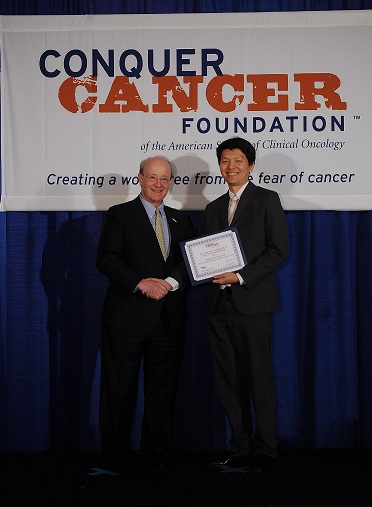Jan 31, 2013
Touching base with LIFe recipient Suebpong Tanasanvimon, MD

ASCO Connection recently caught up with Conquer Cancer Foundation of ASCO fellowship recipient Suebpong Tanasanvimon, MD, of King Chulalongkorn Memorial Hospital, in Bangkok, Thailand. Dr. Tanasanvimon received a 2011 Long-term International Fellowship (LIFe), which was supported by The Cholangiocarcinoma Foundation, to conduct research on cholangiocarcinoma. The LIFe fellowship enables early-career oncologists from low- and middle-income countries to earn valuable experience and training at a U.S. or Canadian institution, which they can then use to facilitate change in cancer care in their home country. Dr. Tanasanvimon will be presenting the research he performed during his LIFe fellowship at the Gastrointestinal Cancers Symposium on January 25, 2013. In the following interview, Dr. Tanasanvimon discusses his views on the current status of gastrointestinal oncology in Thailand and how his research can address Thailand’s unique cholangiocarcinoma problem.
AC: What is the status of gastrointestinal oncology in Thailand?
Dr. Tanasanvimon: It is still not well-established because there are a limited number of oncologists in Thailand. However, in many tertiary centers, surgeons have devoted themselves for particular cancers such as colorectal or liver cancer. In my institute, King Chulalongkorn Memorial Hospital, we have established the multidisciplinary teams for upper gastrointestinal and liver cancers. Although we still focus on solving clinical problems, we will move forward to be more comprehensive, such as including research activity.
AC: Why is gastrointestinal oncology such a challenge in Thailand?
Dr. Tanasanvimon: The leading cancer death in Thailand is gastrointestinal cancer, and we also have our unique cholangiocarcinoma problem. Although cholangiocarcinoma is a rare cancer, especially in Western countries, it has the world’s highest prevalence in Northeastern Thailand. In this area, cholangiocarcinoma is closely related to the liver fluke Opisthorchis Viverrini. The fluke infestation rate is very high because of the local dietary habit of eating raw freshwater fish. Furthermore, the local popular fermented food containing N-nitroso compound, such as nitrate, also contributes in cholangiocarcinoma carcinogenesis in this area.
AC: What is the current status of your project on liver-fluke associated cholangiocarcinoma?
Dr. Tanasanvimon: Our project is to explore the miRNA expression profile in liver-fluke associated cholangiocarcinoma compared with non-liver-fluke associated cholangiocarcinoma. The miRNA expression profiles were different between liver-fluke- and non-liver-fluke associated cholangiocarcinoma, confirming biology difference between these two entities. Also, we have a few interesting miRNA to be explored in depth in my future project. Among them, we have validated miR-200c overexpression in larger samples of liver-fluke associated cholangiocarcinoma, but underexpression in non-liver-fluke associated cholangiocarcinoma. We are going to present these results at Gastrointestinal Cancer Symposium 2013.
AC: What impact will this research have on cancer care in Thailand?
Dr. Tanasanvimon: Although this is just an initial step, the results gave us the foundation to continue our miRNA research project in cholangiocarcinoma in Thailand. The research will focus on the biomarkers for early detection and predicting the prognosis, which will help us improve care for our cholangiocarcinoma patients. Also, this was the first step of research collaboration in cholangiocarcinoma between King Chulalongkorn Memorial Hospital and The University of Texas MD Anderson Cancer Center.
AC: Did you enjoy your time at MD Anderson Cancer Center?
Dr. Tanasanvimon: One of the great things about being a fellow at MD Anderson Cancer Center is you can learn everything in oncology including research and patient care. I met my objective to establish the skills and capability to conduct translational research in oncology. There is no better place to learn how to give the best care for patients with cancer. The effective multidisciplinary team for all kind of cancers here is most impressive to me. It is my goal to establish it at my institute.
AC: What are your future plans for your research on cholangiocarcinomas?
Dr. Tanasanvimon: I will continue miRNA research in liver-fluke cholangiocarcinoma research. The next step is to validate the results of miRNA expression profile study. From that point, I would have the potential miRNAs to be focused for biomarker research in term of diagnostic tools or predictive/prognostic factors. To support all further projects, I will establish a tumor bank primarily for liver and hepatobiliary cancer. This year, I will mainly focus on establishing my research program at my institute and continue the collaboration with MD Anderson Cancer Center. Now, we are initiating the formal collaboration between our two institutes through MD Anderson Cancer Center’s Global Academic Program (GAP).
AC: What has receiving the LIFe award meant to you and for your career?
Dr. Tanasanvimon: The LIFe award gave me the great opportunity to initiate and run a research project specifically focused on my country’s problem. The project itself and research experiences are definitely the foundation for my future research program in order to solve the cholangiocarcinoma problem in Thailand. Additionally, the clinical rotation component of the LIFe award gave me great experience in excellent gastrointestinal cancer care. It will be the model by which we establish our cancer center in Thailand.
AC: When you’re not working, what are some things you like to do in your free time?
Dr. Tanasanvimon: Now there is nothing else but my son. He was born two years ago in Houston, another “best thing” during my fellowship period in the United States. I used to enjoy swimming in my free time; maybe I can do it with him when he’s big enough.
AC: Anything else you’d like to add?
Dr. Tanasanvimon: I would like to thank all contributors and the Conquer Cancer Foundation for initiating the great fellowship opportunity, LIFe award. It is really a great way for the international oncology community to experience and build the collaboration with the North American Cancer Center and their outstanding oncologists and researchers. Particularly to my project, I was grateful for the support of Cholangiocarcinoma Foundation. It is great that there is an organization discern this neglected cancer.
